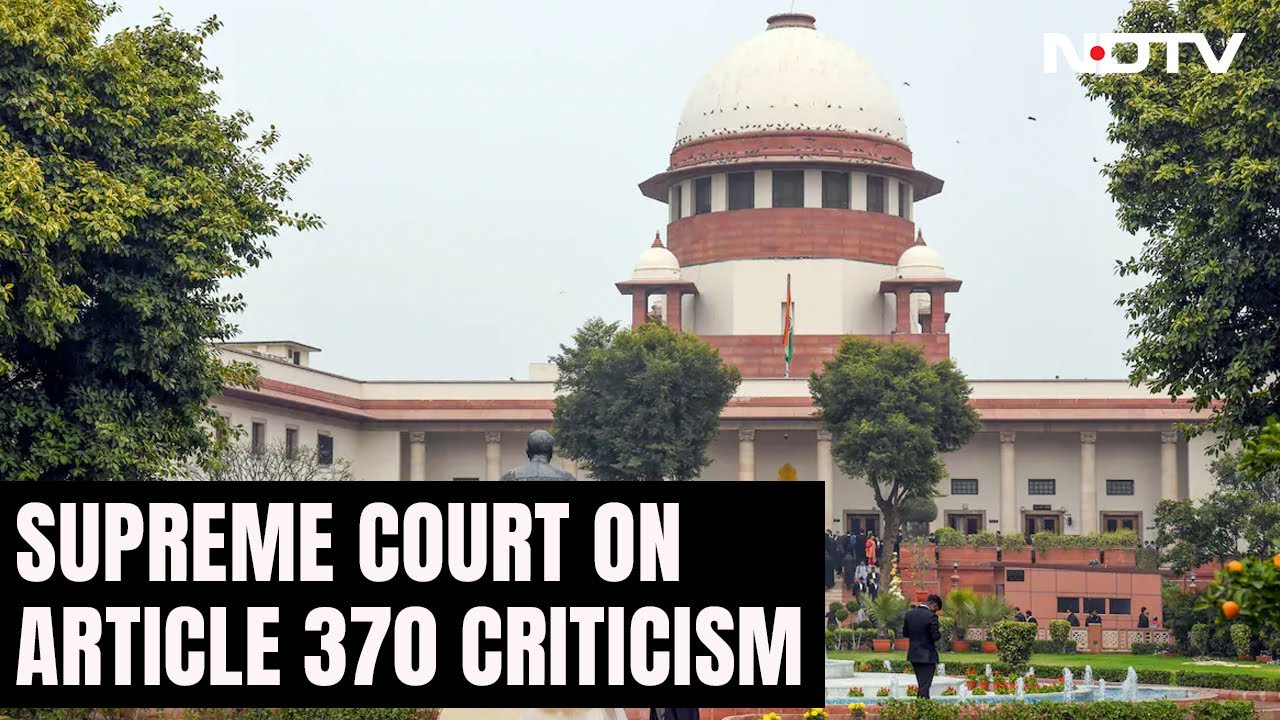
Supreme Court Protects Right to Dissent: Quashes Charges Against Man for WhatsApp Status on Article 370
- Every citizen has right to be critical of Article 370 abrogation: Supreme Court
- The top court’s remarks came as it quashed a criminal case lodged against Javed Ahmad Hajam, a Kashmiri professor working in a Kolhapur college in Maharashtra.
Holding that the right to dissent in a legitimate manner is an integral part of the right to freedom of speech and expression guaranteed under the Constitution, the Supreme Court on Thursday quashed a criminal case against a professor for his WhatsApp status describing abrogation of Article 370 as a ‘Black Day’ for Jammu and Kashmir.
Javed Ahmed Hajam – who hails from Baramulla in Jammu and Kashmir and works as a professor at Sanjay Ghodawat College in Kolhapur district of Maharashtra — had in a WhatsApp group of teachers and parents, posted — “August 5 – Black Day Jammu & Kashmir.”,“14th August – Independence Day Pakistan”.
An FIR was lodged against him at PS Hatkanangle, Kolhapur district, under Section 153-A of the Indian Penal Code for promoting enmity between different groups on grounds of religion, race, place of birth, residence, language, etc., and doing acts prejudicial to maintenance of harmony.
Terming it as an expression of his individual view and his reaction to the abrogation of Article 370 of the Constitution, a Bench led by Justice AS Oka said, “It does not reflect any intention to do something which is prohibited under Section 153-A. At best, it is a protest, which is a part of his freedom of speech and expression guaranteed by Article 19(1)(a). Every citizen of India has a right to be critical of the action of abrogation of Article 370 and the change of status of Jammu and Kashmir.”
It said, “Now, the time has come to enlighten and educate our police machinery on the concept of freedom of speech and expression guaranteed by Article 19(1)(a) of the Constitution and the extent of reasonable restraint on their free speech and expression. They must be sensitised about the democratic values enshrined in our Constitution.”
The Bench said, “Describing the day the abrogation happened as a ‘Black Day’ is an expression of protest and anguish. If every criticism or protest of the actions of the state is to be held as an offence under Section 153-A, democracy, which is an essential feature of the Constitution of India, will not survive. The right to dissent in a legitimate and lawful manner is an integral part of the rights guaranteed under Article 19(1)(a). Every individual must respect the right of others to dissent.
“An opportunity to peacefully protest against the decisions of the Government is an essential part of democracy. The right to dissent in a lawful manner must be treated as a part of the right to lead a dignified and meaningful life guaranteed by Article 21. But the protest or dissent must be within four corners of the modes permissible in a democratic set-up. It is subject to reasonable restrictions imposed in accordance with clause (2) of Article 19. In the present case, the appellant has not at all crossed the line,” it said.
As regards the picture containing “Chand” and below that the words “14th August–Happy Independence Day Pakistan”, the Bench said, “We are of the view that it will not attract clause (a) of sub-section (1) of Section 153-A of the IPC. Every citizen has the right to extend good wishes to the citizens of the other countries on their respective independence days.”
Allowing Hajam’s appeal against the high court’s April 10, 2023 verdict, it said, “If a citizen of India extends good wishes to the citizens of Pakistan on 14th August, which is their Independence Day, there is nothing wrong with it. It’s a gesture of goodwill. In such a case, it cannot be said that such acts will tend to create disharmony or feelings of enmity, hatred or ill-will between different religious groups. Motives cannot be attributed to the appellant only because he belongs to a particular religion.”
The top court said the effect of the words used by the appellant on his WhatsApp status will have to be judged from the standards of reasonable women and men. “We cannot apply the standards of people with weak and vacillating minds. Our country has been a democratic republic for more than 75 years. The people of our country know the importance of democratic values,” it noted.

